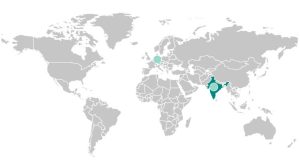Germany is known for its high-quality healthcare system, and it continuously seeks skilled healthcare professionals, including nurses. If you’re a foreigner looking to become a nurse in Germany, the process might seem daunting, but with the right information and preparation, you can successfully navigate the steps. This guide provides a detailed, step-by-step process to help you understand how to become a nurse in Germany.
Understanding the Requirements
Before starting the process, it’s essential to understand the basic requirements needed to work as a nurse in Germany:
1. Recognized Nursing Qualification: Your nursing qualification must be recognized in Germany. This often requires your credentials to be evaluated and possibly adjusted to meet German standards.
2. German Language Proficiency: You need to be proficient in the German language, typically at a B2 level or higher, as most healthcare environments require fluent communication with patients and colleagues.
3. Professional License: You must obtain a professional nursing license (Anerkennung) to practice nursing in Germany.
Step-by-Step Process
1. Obtain Recognition of Your Nursing Qualification
a. Evaluation of Foreign Qualifications
First, you need to have your nursing qualifications evaluated. This process involves:
• Contacting the Relevant Authority: Each federal state (Bundesland) in Germany has its own authority responsible for recognizing foreign nursing qualifications. You can find the appropriate authority through the Anerkennung in Deutschland website.
• Submitting Documents: You will need to submit your nursing degree, transcripts, and a detailed description of your training. These documents should be translated into German by a certified translator.
• Equivalence Assessment: The authority will compare your qualifications to German standards. If there are significant differences, you might need to complete additional training or courses in Germany.
b. Adaptation Course or Aptitude Test
If your qualifications are not fully equivalent, you may be required to complete an adaptation course or pass an aptitude test to bridge the gap. These are designed to ensure that you meet the professional standards required in Germany.
2. Achieve German Language Proficiency
Proficiency in German is crucial for effective communication in a healthcare setting. Here’s how you can improve your German language skills:
• Language Courses: Enroll in language courses that specifically prepare you for the B2 or higher level, which is the required proficiency for nursing.
• Language Certificates: Obtain a recognized language certificate from institutions like Goethe-Institut or TELC.
• Practice Regularly: Engage in regular conversation practice, participate in language exchange programs, or use language learning apps.
3. Apply for a Nursing License (Anerkennung)
Once your qualifications are recognized and you have achieved the necessary language proficiency, the next step is to apply for a nursing license:
• Application Submission: Submit your application for recognition (Anerkennung) to the relevant authority in the federal state where you intend to work.
• Documentation: Provide all necessary documents, including your recognized nursing qualification, language certificate, proof of identity, and proof of health fitness.
• Decision: The authority will review your application and decide on your eligibility to work as a nurse in Germany. If approved, you will receive your nursing license.
4. Secure Employment
With your nursing license in hand, you can now seek employment in the German healthcare sector:
• Job Search: Look for job opportunities through online job portals, hospital websites, and recruitment agencies specializing in healthcare.
• Prepare Your CV and Cover Letter: Ensure your CV and cover letter are tailored to the German job market, highlighting your qualifications, experience, and language skills.
• Interviews: Be prepared for interviews, which may include both technical questions and assessments of your language proficiency.
5. Relocation and Integration
After securing a job, the final steps involve relocating to Germany and integrating into your new workplace and community:
• Visa and Work Permit: Apply for a visa and work permit through the German embassy or consulate in your home country. Your employer can often assist with this process.
• Accommodation: Arrange for housing before your arrival. Many hospitals offer accommodation assistance for their international staff.
• Cultural Integration: Familiarize yourself with German culture, healthcare practices, and workplace norms. Joining community groups or professional networks can be helpful.
Conclusion
Becoming a nurse in Germany as a foreigner involves a series of well-defined steps, from having your qualifications recognized to securing employment and integrating into the healthcare system. While the process can be challenging, the demand for skilled nurses in Germany offers a rewarding career opportunity.
If you need assistance with the process, GloberiaGlobal – International Recruitment Company, based in Germany, specializes in helping international nurses with every step of their journey. They provide support with recognition of qualifications, language courses, job placement, and relocation, ensuring a smooth transition into the German healthcare system.
For more information and personalized assistance, you can contact GloberiaGlobal at www.globeriaglobal.com.



